|
|
|
Sort Order |
|
|
|
Items / Page
|
|
|
|
|
|
|
| Srl | Item |
| 1 |
ID:
114467
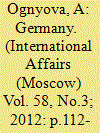

|
|
|
|
|
| Publication |
2012.
|
| Summary/Abstract |
"YOU CANNOT CREATE CULTURE with politics. Perhaps you can create politics with culture," first President of the FRG Theodor Heuss said at the height of the Cold War.1 Today, this is as true as ever: culture remains a powerful and efficient instrument of foreign policy; it can improve the state's image abroad, multiply its friends and contribute to its political projects.
|
|
|
|
|
|
|
|
|
|
|
|
|
|
|
|
| 2 |
ID:
097542
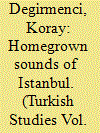

|
|
|
| 3 |
ID:
101926
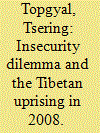

|
|
|
|
|
| Publication |
2011.
|
| Summary/Abstract |
In March 2008, Tibet erupted in the biggest challenge to Chinese rule since 1959. While Beijing and Dharamsala engaged in their familiar battle of representations, pundits speculated on the causes of the uprising, ranging from conspiracy theories to informed policy analysis. Applying the framework of the insecurity dilemma, this article argues that Tibetan identity insecurity on account of the post-1989 hard-line Chinese policies was the chief cause of the uprising. Largely peaceful protests and occasionally violent riots in Tibet have been integral to Tibetan efforts to mitigate their societal insecurities provoked by Chinese migration, 'assimilationist' policies and 'cultural imperialism'. However, Tibetan protests and riots heighten Chinese insecurities and harden Beijing's policies both inside Tibet and towards the Dalai Lama. This paper reveals the dynamic cycle of hard-line Chinese policies provoking Tibetan uprisings; the resulting hardening in Chinese policies feeds back into Tibetan insecurities and protests. The 2008 uprising was the most recent cycle in the long-running saga of the Sino-Tibetan insecurity dilemma. The article warns that unless the Tibetans and the Chinese find a way to break out of the insecurity dilemma, Tibet could explode into another frenzy of violence and counter-violence in the near future.
|
|
|
|
|
|
|
|
|
|
|
|
|
|
|
|
| 4 |
ID:
095139
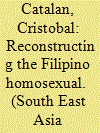

|
|
|
|
|
| Publication |
2010.
|
| Summary/Abstract |
Since the 1970s, Filipino cinema has presented internationally distinguished narratives on same-sex sexuality. Contemporary films from the Philippines dealing with issues of sexuality demonstrate an increasing interest in Filipino men who identify themselves as gay. Looking closely at two such films, Ang Lalake sa Parola (Man in the Lighthouse, dir Joselito Altarejo, 2007) and Bathhouse (dir Crisaldo Pablo, 2005), this paper examines how Filipino men engage with (or disengage from) the global gay construct. Drawing on ethnographic research, queer theory and post-colonial discourse, this article analyses how these filmic texts reflect the changing diversities of incumbent homosexual and global gay subjectivities. Using notions of cultural imperialism and protest as a conceptual backdrop, the paper considers the relevance of dichotomies - global/local or metropolitan/rural - in understanding appropriations of the gay identity by characters tied to globalized spaces. Its contention is that these texts illustrate how same-sex screen identities are recontextualized, visually and diegetically, through self-peripheralization of the body and of the self. The author argues that the reshaping and redistribution of homosexual identities is synonymous with a reconstituted (national) resistance to non-Filipino global gay identities.
|
|
|
|
|
|
|
|
|
|
|
|
|
|
|
|
| 5 |
ID:
080873
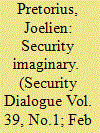

|
|
|
|
|
| Publication |
2008.
|
| Summary/Abstract |
This article proposes the notion of a security imaginary as a heuristic tool for exploring military isomorphism (the phenomenon that weapons and military strategies begin to look the same across the world) at a time when the US model of defence transformation is being adopted by an increasing number of countries. Built on a critical constructivist foundation, the security-imaginary approach is contrasted with rationalist and neo-institutionalist ways of explaining military diffusion and emulation. Merging cultural and constructivist themes, the article offers a `strong cultural' argument to explain why a country would emulate a foreign military model and how this model is constituted in and comes to constitute a society's security imaginary
|
|
|
|
|
|
|
|
|
|
|
|
|
|
|
|
| 6 |
ID:
126317


|
|
|
|
|
| Publication |
2013.
|
| Summary/Abstract |
In the inter-war years, it was important for Britain to preserve friendly relations and influence throughout its empire to maintain competitive advantage in markets in a time of austerity. One way of doing this was through the export of cultural imperialism, and colonial administrations in particular were keen to maintain their hold over indigenous populations by preserving the cultural ideologies and brand (and thereby associated power) of the mother country. David Hammond argues that the military band was a particularly effective and economical resource for this: through the expression of British symbols, routines and rituals, they epitomised the British control systems and power structures without the need for 'hard power' engagement.
|
|
|
|
|
|
|
|
|
|
|
|
|
|
|
|
| 7 |
ID:
130250
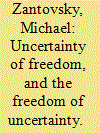

|
|
|
|
|
| Publication |
2014.
|
| Summary/Abstract |
It likely has occurred to everyone at least once that it would be a wonderful thing to win the lottery. And many of us have indeed bought a lottery ticket at least once in our lives, only to validate the well-known fact that the chances of winning in a lottery are rather small. Some of us, though, may have not put up with this sober conclusion and proceeded on the assumption that if we bought two tickets our chances of winning the lottery would increase twofold, and then perhaps extrapolated the logic to three, five, or even ten tickets. And a few of us might have even entertained the theoretical possibility that if we bought all the tickets we would be assured of winning the lottery. There is nothing wrong with dreaming of a stroke of luck and trying to maximize one's chances. But it also pays to use common sense and elementary knowledge of the probability calculus. Buying all the lottery tickets will not only give you an absolute certainty of winning but also an absolute certainty of losing vast amounts of money in the process.
But what, one may ask, does buying a lottery ticket have to do with freedom? Freedom, after all, is arguably not an outcome of a random process like winning in a lottery. It is a conscious choice to believe that men are born with certain inalienable rights and should be thus free to make decisions about their lives. Based on this belief, we build the institutions of a free society, provide them with the necessary checks and balances, and guarantee the rule of law to prevent arbitrary punishment and thwart attempts to hijack our freedom. For all the problems of a free society, we believe with Winston Churchill that democracy, the political system that embodies, maintains, and administers a free society, is vastly preferable to all the alternatives. Living in a democracy, we believe that we have hit the jackpot in the lottery of political systems.
|
|
|
|
|
|
|
|
|
|
|
|
|
|
|
|
| 8 |
ID:
108478
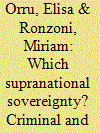

|
|
|
|
|
| Publication |
2011.
|
| Summary/Abstract |
The idea that transnational dynamics challenge the regulatory capacity of the state has hardly ever received as much attention as in contemporary debates. Different voices denounce the crisis of the state and advocate the establishment of supranational institutions with legally coercive power. It is tempting to jump to the conclusion that these voices are concerned with the same cluster of problems. We think that one should resist this temptation. Firstly, not all the problems pointed out by the advocates of supranational sovereignty are of the same kind and structure. Some concern the need to limit the power of states, whereas others address the almost opposite necessity to support and strengthen their problem-solving capacity through forms of international regulation. Secondly, the corresponding solutions are different. In particular, although they may all imply the establishment of supranational institutions, not all such institutions need be global. The creation of a full-blown global rule of criminal law, for instance, would raise serious concerns of global despotism and cultural imperialism, and we therefore make a case for regional and context-sensitive solutions in this case. However, problems of supranational socioeconomic justice can only be addressed through global regulatory institutions, for regional institutions would, in this case, only recreate current problems at the interregional level.
|
|
|
|
|
|
|
|
|
|
|
|
|
|
|
|
|
|
|
|
|